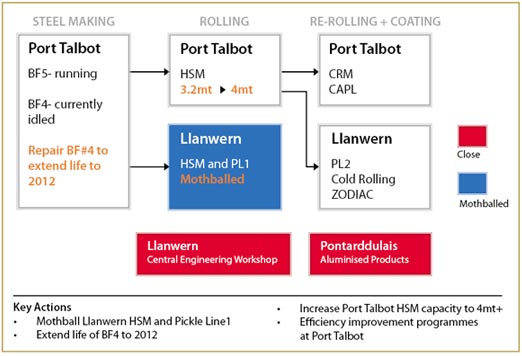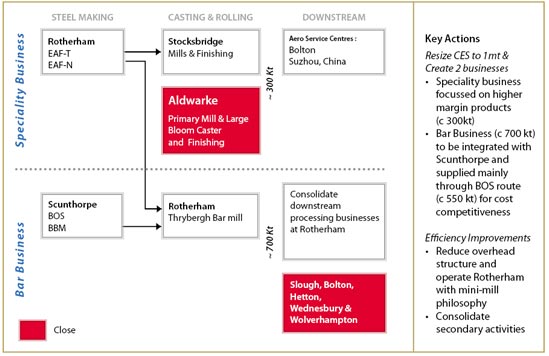
Responding to the Crisis
Fit for Future
The main items in the ‘Fit for Future’ initiative included divestment, asset restructuring and an efficiency and overhead review. Taken together these items will provide additional annual cost savings of more than £200 million. The initiative also put about 3,500 jobs out of the company’s 42,000-strong workforce at risk, mainly in the UK and the Netherlands – a situation that has been sensitively and honestly handled.
- Divestments: During the last fiscal quarter, in February 2009, Tata Steel Europe completed the sale of its two aluminium smelters in the Netherlands and Germany to Klesch & Co.
In January it signed a non-binding Memorandum of Understanding with Marcegaglia SpA and Dongkuk Steel Mill Co. Ltd. on the sale of a majority stake in its Teesside Cast Products (TCP) business unit in northeast England. However, in April 2009 the consortium of Offtakers responsible for 80% of TCP’s output issued Corus with a Notice of Termination of the binding 10-year Offtake Framework Agreement. As a direct consequence, in May 2009 the company announced that it has been forced to open negotiations that might result in a decision to mothball the TCP operation. Discussions with employees and their representatives are continuing but any decision to mothball is likely to lead to a significant number of redundancies.
- Asset Restructuring: The Company mothballed some of the rolling equipment at its Llanwern plant in South Wales and drew up plans to expand the hot strip mill capacity at Port Talbot to over 4mt. A decision was also taken to restructure Corus Engineering Steels into two production routes: a specialised electric arc furnace based business, which will focus on higher-margin products, and a bar business that is integrated with the Scunthorpe works. Facilities in the downstream Corus Distribution and Building Systems division, in the downstream units of Corus’ engineering steels business, and in the Corus Tubes businesses are being restructured and some site closures have been announced.
STRIP UK

CES (CORUS ENGINEERING STEELS)

The above initiatives were drawn up with the intention of maintaining and developing the business’s market share.
- Efficiency and Overhead Review: Partly in order to realign support functions with the new, smaller group scale, Tata Steel Europe initiated an efficiency and overhead review designed to cut manpower costs by 20% in areas such as IT, Human Resources and Finance among others. Overheads are targeted to be reduced by 20% through the leveraging of Tata Steel Group’s capabilities worldwide and efficiency improvements in the areas of IT, Research & Development and the corporate centre.
Tata Steel Europe has opened consultations about the jobs identified at the end of January 2009 as being at risk with trade unions and other employee representatives. The company committed itself to seeking to reduce the workforce, wherever practical, through voluntary redundancies and offering those affected, comprehensive redundancy packages and outplacement support services. Finally, the company announced a proposal to close the defined-benefit British Steel Pension Scheme to new recruits and to take steps to ensure the company contribution to future service for existing members remains at 12%.